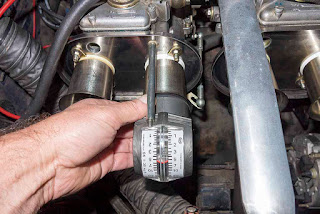It's been quite a while since my
last update on the continuing search for the mysterious misfire on #3 cylinder
in 't Kreng. Mainly caused by a 4 week holiday which involved three trips
covering the Moesel Area in Germany, Süd Tirol and Great Britain for Club
Triumphs RBRR 2014. But I did do some checks whenever time allowed. The most
important check was using the strobe light to see if all plugs received a pulse
from the dizzy. All were fine except #3. It did get a pulse so now and then,
but rather randomly. As the car is running an electronic ignition system this
was rather strange as these either work or don't. So the problem might as well
be over-fuelling.
And last weekend I was able to
work on the car for a full day, especially the carburettors. Really wanted to
rule out the ignition first but as I didn't have all the parts needed to
convert to points I decided to remove the carburettors and have a proper look
inside ...
As you can see they were
completely clean inside. At least the two inline filters are doing a proper
job. Also no blockages, loose jets, sticky valves or worn butterfly spindles.
Absolutely nothing to find that could explain the misfiring. Until I saw this
...
When removing the rear
carburettor I found it to be slightly loose. Although squirting some start
pilot along the flanges hadn't revealed anything wrong, there clearly was. Only
explanation I can come up with is that the loads from throttle lever between
front and rear carburettor, together with slightly worn rubber mounts enabled
the rear carburettor to move a little and wear out the holes. Just to be safe I
decided to swap the carburettors so the worn flange would get some rest. Also
decide to tighten up the nuts a little more, so there is less movement for the
carburettors. But the gut feeling I had, that the badly aligned carburettor
wouldn't be the cause for the problem, was proved correct once the engine was
fired up and was still misfiring on #3.
Left me with one final check,
change the ignition back to points and hope that would give the solution. But
before removing the distributor from the car I thought it a good idea to follow
a friends advice and swap the rotor arm only.
Although a long shot, he has
seen some pretty weird faults caused by a faulty rotor, even new ones. And as
it was a pretty quick swap there was no harm in it. Needless to say that I was
pleasantly surprised when I started the engine and it ran pretty smooth. Not
yet as good as it used to, but markedly better. Still a bit lumpy, but the misfiring
had disappeared completely. So I didn't waste much time and went for a little
test drive. She behaved as if nothing had ever happened. Only when I returned home with
the engine fully on temperature, it became clear the carburettors needed a
proper tune up. But after the work done
over the past months that was easy, especially with the correct tools ...
But it did remind me of the fact that #1 cylinder is slightly down on compression. Giving a slightly lower reading on the gauge compared to the other three. So I will use the car for the final reconnaissance of our Nachtrit next Saturday, and see what effect that has on the compression of cylinder #1.




No comments:
Post a Comment